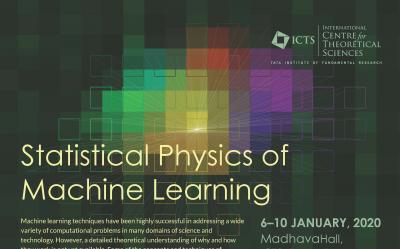Machine learning techniques, especially “deep learning” using multilayer neural networks, have been highly successful in addressing a wide variety of computational problems in many domains of science and technology. However, a detailed theoretical understanding of why and how they work is not yet available. Some of the concepts and techniques of statistical physics, in which one routinely deals with theoretical descriptions of collective properties of systems consisting of very large numbers of interacting variables, are expected to be useful in analysing how deep networks function. The inherent variability of real-world data sets can be handled by techniques developed in the statistical physics of disordered systems such as spin glasses. Also, it has been suggested that tools in statistical physics, such as renormalization-group transformations and quantum annealing, may be useful in improving the performance of deep networks. In addition, machine learning methods are now being used to solve a wide variety of problems in physics, such as analysis of particle accelerator data, detection of phases and phase transitions from simulation data, and design of materials with desired properties.
In view of these connections between statistical physics and machine learning, bringing together groups of theoretical computer scientists and physicists for exchange of ideas and discussions on concepts and techniques of common interest, would be ideal. The proposed Discussion Meeting on “Statistical Physics and Machine Learning” aims to do just the same. This meeting is to be held in conjunction with a set of three Turing Lectures, to be delivered by Professor Marc Mezard, and will feature invited talks by leading experts whose research involves an overlap between machine learning and statistical physics. The primary objective of this Discussion Meeting is to facilitate interaction between the speakers and participants consisting of theoretical physicists and computer scientists.
Eligibility Criteria: Registration is open to advanced graduate students, postdocs and other researchers working in the areas of theoretical physics and computer science.
 icts
icts res
res in
in

